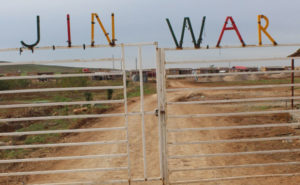A female-only ecological village, which welcomes displaced women of all ethnicities and religions of northeast Syria, represents one of many feminist practices that have been born of the women’s revolution.
The Rojava revolution has been discussed by reason of its many unique democratic characteristics, but especially as a women’s revolution, in which women have led their communities in all ranks of military, political, admnistrative and social life.
Located in the west of the Dirbesiyê district of Al-Hasakah (Hesekê) Canton, the female-only village was born through the efforts of women who led the revolutionary process in Rojava.
The construction of the village was started in March 2017 and completed in November 2018. Since then, the ecological co-operative, called Jinwar (Women’s Land), is home to women and their children. Many of the women were displaced by the attacks of ISIS and widowed in the fight against it.
Shaped on a model conceived by Abdullah Öcalan, an ecological economy and communal life based on pluralist democracy and women’s solidarity is being put into practice by the women of Jinwar. No single woman sits in the chair of the administration of the commune in this village; the Jinwar Council, formed in December 2018, elects a new village representative each month, allowing all women to participate in the decision-making process.
Building their own homes, growing their own food, baking their own bread, the women of Jinwar have built a new life of freedom with their own hands. They contribute to the village’s communal economy through a shop where they sell handmade products.
While the women enjoy researching the science of Jineology (Women’s Studies as developed by the Kurdish women’s freedom movement and ideas of Abdullah Öcalan) in Jinwar Academy, their children continue their education according to the democratic education curriculum of the Autonomous Administration of North and East Syria (AANES).
There are currently 30 homes in the village, as well as Jinwar Academy, Uveys Kindergarten, Ashnan Bakery, Jinwar Shop, Healing Jin health center and Animal Inn, all built by the women of the village.
Women from northeast Syria are not the only people living here. There are also women from minority ethnic groups from Rojava, as well as women from Turkey and various other countries, all contributing to the alternative life of Jinwar. Over the years, Jinwar has received large numbers of guests, including women’s delegations from the Middle East, Europe and many other parts of the world.


